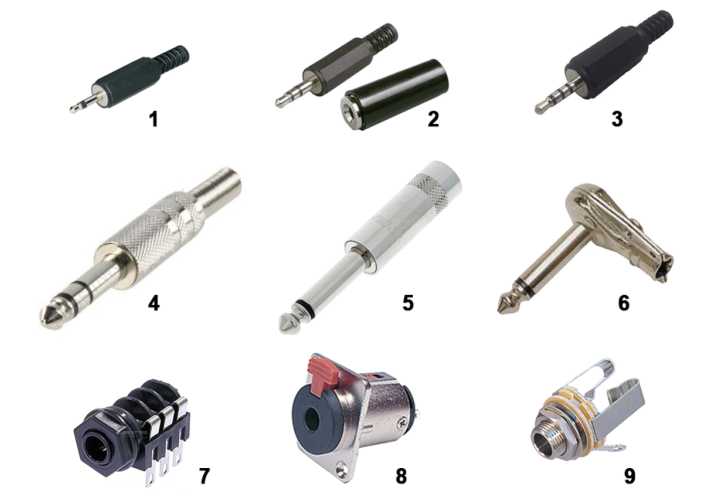Appendix 2Audio Connectivity
A2.1. Introduction
Pieces of professional audio equipment are connected to each other by cables that carry different types of signals. Each of them has a more or less standardized but very diverse connector system. This appendix presents most of the plugs, sockets or connectors used by many pieces of equipment, especially microphones.
A2.2. Coaxial jack
The jack connector is a coaxial connector that has existed for many years (invented in 1877) and is available in different types.
It can be mono (two contacts), stereo (three contacts), multi-pole (four contacts), male, female, chassis according to different diameters:
- – ¼”or 6.35 mm;
- – 0.206” or 5.23 mm (aviation standard PJ-068);
- – 4.4 mm called a “bantam” or “TT”;
- – 3.5 mm (invented in the 1960s) called “miniature”;
- – 2.5 mm called “subminiature”.
The connection points of a 6.35 mm jack are often designated with the letters “T” (Tip), “R” (Ring), “S” (Sleeve).
A mono jack has two points of contact: the tip and the sleeve, or “TS”.

Figure A2.1. Some models of coaxial jacks. 1) subminiature 2.5 mm mono male jack, 2) 3.5 mm miniature stereo male jack, 3) 3.5 mm miniature multi-pole male jack, 4) 6.35 mm (1/4’’) stereo male jack, 5) 6.35 mm mono male jack, 6) 6.35 mm angled mono male jack, 7) 6.35 mm chassis stereo jack, 8) 6.35 mm chassis mono jack, 9) 6.35 mm chassis mono jack. For a color ...
Get Recording and Voice Processing, Volume 2 now with the O’Reilly learning platform.
O’Reilly members experience books, live events, courses curated by job role, and more from O’Reilly and nearly 200 top publishers.

